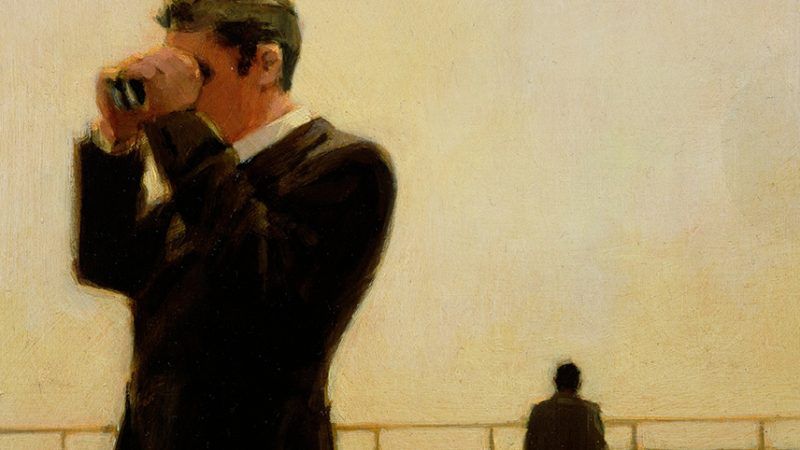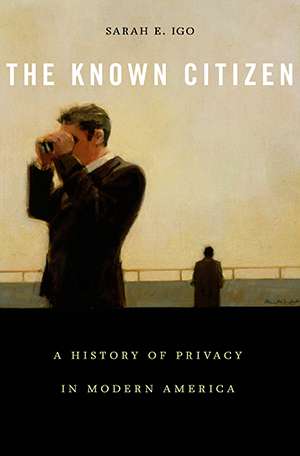How We Lost Privacy
Today people are shamed for not sharing personal information about themselves.

The Known Citizen: A History of Privacy in Modern America, by Sarah E. Igo, Harvard University Press, 540 pages, $35

A couple of years ago, I went to dinner at the Seattle Space Needle. To my surprise—I was over 30—the waiter asked to see ID when I ordered wine. I hadn't brought my purse from the hotel, so I had nothing with which to prove my age. In retrospect, this probably saved me from a $100 bar tab at their prices, but at the time I was annoyed.
Although we aren't officially required by law to carry identification, in practice it is necessary to get through many interactions. This has become increasingly true over time. As a teenager I bought booze without problems. I can also recall being able to fly domestically without showing ID. I still often go out with nothing but some cash in my pocket. Nonetheless, like all of you, I leave a paper trail of account numbers, credit scores, and biometric photos wherever I go.
In The Known Citizen, a highly readable new history of privacy in America, the Vanderbilt historian and legal scholar Sarah Igo offers insight into the ways attitudes have evolved as different forms of identification, and different expectations of privacy, have emerged.
When future Supreme Court justice Louis Brandeis conceived of privacy as a "right to be left alone" in the Harvard Law Review in 1890, he meant a right to be free from intrusive media attention. The state's attentions were less of a concern to him. The inflection point, the time when privacy advocates focused their attention on the federal government, was the New Deal.
Social Security numbers presented a major issue for anyone who saw government registration as an infringement of civil liberties. But as Igo shows, linking Social Security clearly with the benefits to be garnered from registration turned most citizens in favor of the idea. Being enrolled in Social Security showed that one was gainfully employed, an upright citizen. In the early days of the system, some people even chose to have themselves tattooed with their number.
The government promised that the numbers would be used only for Social Security purposes, but they soon crept into different federal agencies' files, becoming, just as skeptics had feared, a general means of identifying citizens. Since the 1980s, Social Security numbers have been widely issued at birth; an entire generation of Americans have now lived their entire lives with open federal files.
As the public became more relaxed about Social Security numbers, privacy concerns shifted elsewhere. After the Second World War, Americans pursued privacy in the form of the single-family home in the suburbs. Children would have their own bedrooms; the nuclear family would be free from extended relations and lodgers. But to some people's disappointment, the suburban ideal didn't free everyone from snooping neighbors. Away from the anonymity of cities, residents sometimes found themselves under more surveillance, subject to social censure for transgressing community norms.
Expectations of privacy in the home are also culturally freighted, to a degree Igo doesn't fully cover. Northwestern European architecture (which was imported to the U.S.) tends to have houses with windows facing the street, allowing others to see in as the occupants see out. In much of Holland, it was traditional not even to have curtains, such was the literal transparency of good Protestant living. This is very different from the cloistered, courtyard-based styles of southern Europe and parts of Asia, where passers-by can see nothing of a house's interior. Adjusting to American norms of domestic privacy was part of an immigrant's assimilation.
Anxiety in this space ran high in the 1960s with concerns about wiretapping and eavesdropping. Popular magazines described how tiny transmitters could be concealed, and high-profile court cases tested the police's right to listen in on phone conversations. Some of the fascination with spy gadgets probably bled over from popular culture—this was the era of James Bond and Mission: Impossible, after all. The number of micro transmitters actually hidden in martini olives or behind tie pins must have been very small. But the concern also demonstrates how much our expectations have changed since then.
Where people once feared surveillance in their residences, their children now provide the cameras and microphones themselves. Home security systems offer live video streams accessible anywhere. People share their private conversations with devices such as Google Home and Amazon's Echo. The recent subpoena of an Alexa—the artificial intelligence inside an Echo—that may have "witnessed" a homicide should give all of us pause about what our devices may be recording even when we think they're not.
That's the crux of the matter: Even people who resist the idea of the government having our information will willingly open the curtains to private companies—some of whom then turn what they learn over to the government, or leave it vulnerable to hackers. They have our names, our addresses, our bank details, our pictures, our email correspondence, even our current heart rate. Their geotracking knows where we are at any time.
The same shift can be seen with fingerprinting. Early initiatives to fingerprint all citizens, or even just those in particular occupations, faced fierce resistance. Fingerprinting was associated with criminals and enemy aliens, not upstanding free individuals. To be classed among the undesirables in that way was degrading and offensive.
Today, we happily give our prints to Apple so we can use them to unlock our smartphones.
Igo also considers privacy in terms of citizens' rights to be free from other kinds of intrusion, such as involuntary participation in medical studies. Medical privacy laws and modern norms around informed consent emerged in the 1970s, changing both how health care providers operate and how universities must treat research subjects. Our legal right to information held about us, through the Freedom of Information Act and the Family Educational Rights and Privacy Act, has allowed citizens to take a peek at their permanent records.
The Supreme Court has invoked a presumed right to privacy in several landmark rulings about the state's right to intervene in a citizen's personal life. From a legal standpoint, nonetheless, the "right to privacy" is something of a quagmire. Although the 1965 birth control ruling Griswold v. Connecticut and the 1973 abortion ruling Roe v. Wade both hinged on the idea, the Framers did not specify such a general right in the Constitution.
Whatever claim we may have to privacy, the state rides over in other circumstances. To this day, privacy doesn't protect me from criminal charges if I'm caught using heroin or practicing bigamy, although those activities are arguably just as private as the choice to use contraception or terminate a pregnancy.
Our views on what should be kept private have changed in the culture as well as the courtroom. Writers now produce tell-all autobiographies that would have left earlier generations with mouths agape. We don't blink when a celebrity admits to drug use, infidelity, cosmetic surgery, or any number of things that previous eras would have deemed private. In fact, we celebrate such openness. Revealing your personal history is now seen as "brave."
Things once held to be shameful are now accepted, even lauded, and those who don't want to share the details of their personal lives are portrayed as uptight or weird. Gays get shamed for not coming out, as though by keeping their private lives private they are betraying society at large.
Privacy keeps its hold on some things, of course: There is a reason we have a reality show called Celebrity Rehab but not one called Celebrity Abortion Clinic. Some things people won't share, even in our "let it all hang out" culture. But we live in an age where people clamor to expose their personal lives on TV, and where those who don't have access to a television studio still offer videos of themselves on Instagram and Facebook. They demand the right not to be let alone. Louis Brandeis must be turning in his grave.
This article originally appeared in print under the headline "How We Lost Privacy."


Show Comments (39)